Gutter Cleaning Noblesville
Top 10 Roof Gutter Cleaning in Noblesville
Receive multiple Gutter Cleaning and Repair quotes for your project today! Compare profiles, reviews, accreditations, portfolio, etc... and choose the best deal.
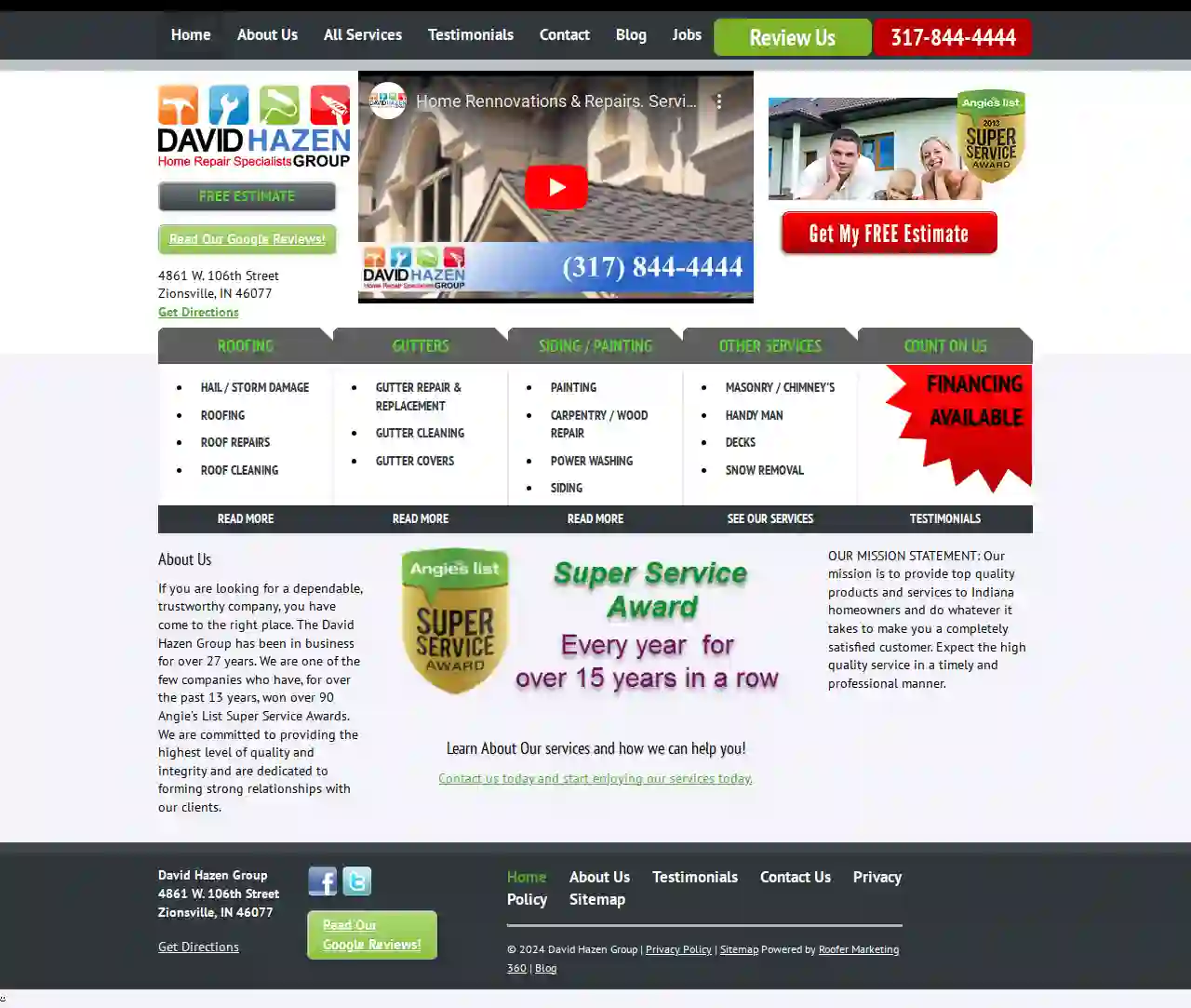
David Hazen Group
4.972 reviews4861 W. 106th Street, Zionsville, 46077, USThe David Hazen Group has been in business for over 27 years, providing top quality products and services to Indiana homeowners. We are committed to providing the highest level of quality and integrity and are dedicated to forming strong relationships with our clients. Our mission is to provide top quality products and services to Indiana homeowners and do whatever it takes to make you a completely satisfied customer. Expect the high quality service in a timely and professional manner.
- Services
- Why Us?
- Accreditations
- Our Team
- Testimonials
- Gallery
Get Quote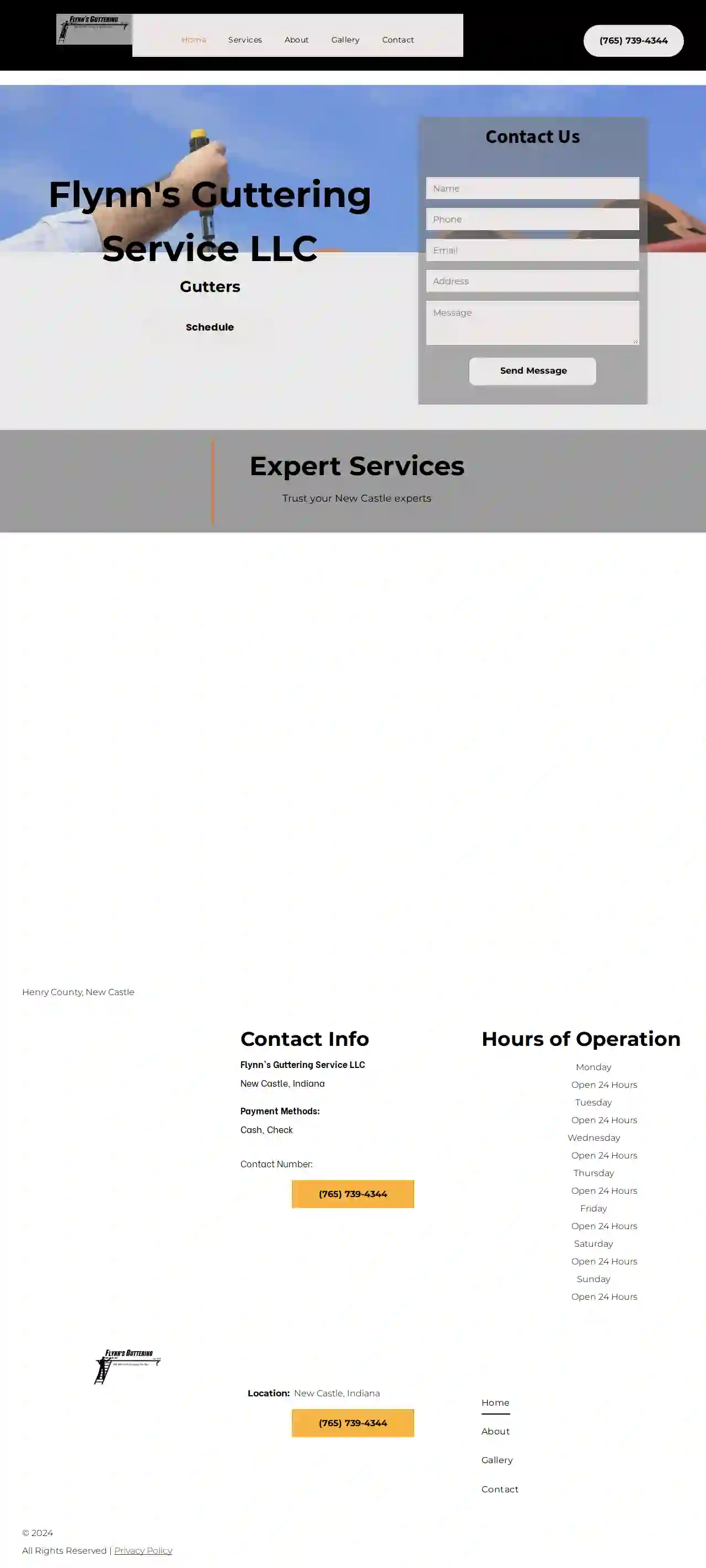
Flynn's Guttering Service LLC
51 reviews1000 S Memorial Dr, New Castle, 47362, USFlynn's Guttering Service LLC is a locally owned and operated business serving New Castle, Indiana and the surrounding area for over 50 years. We are a third-generation, family-owned company dedicated to providing top-notch gutter services to both residential and commercial customers. Our commitment to quality is evident in every project we undertake, and our mission has always been to focus on our customers' needs. We offer a wide range range of services, including gutter cleaning, installations, repairs, and replacements. We also specialize in installing and repairing gutter screens and guards, as well as metalwork, soffit and fascia installations and repairs. At Flynn's Guttering Service, we believe in building lasting relationships with our customers by providing exceptional service and exceeding their expectations. We are proud to be a trusted name in the community and are committed to delivering a superior experience.
- Services
- Why Us?
- Gallery
Get Quote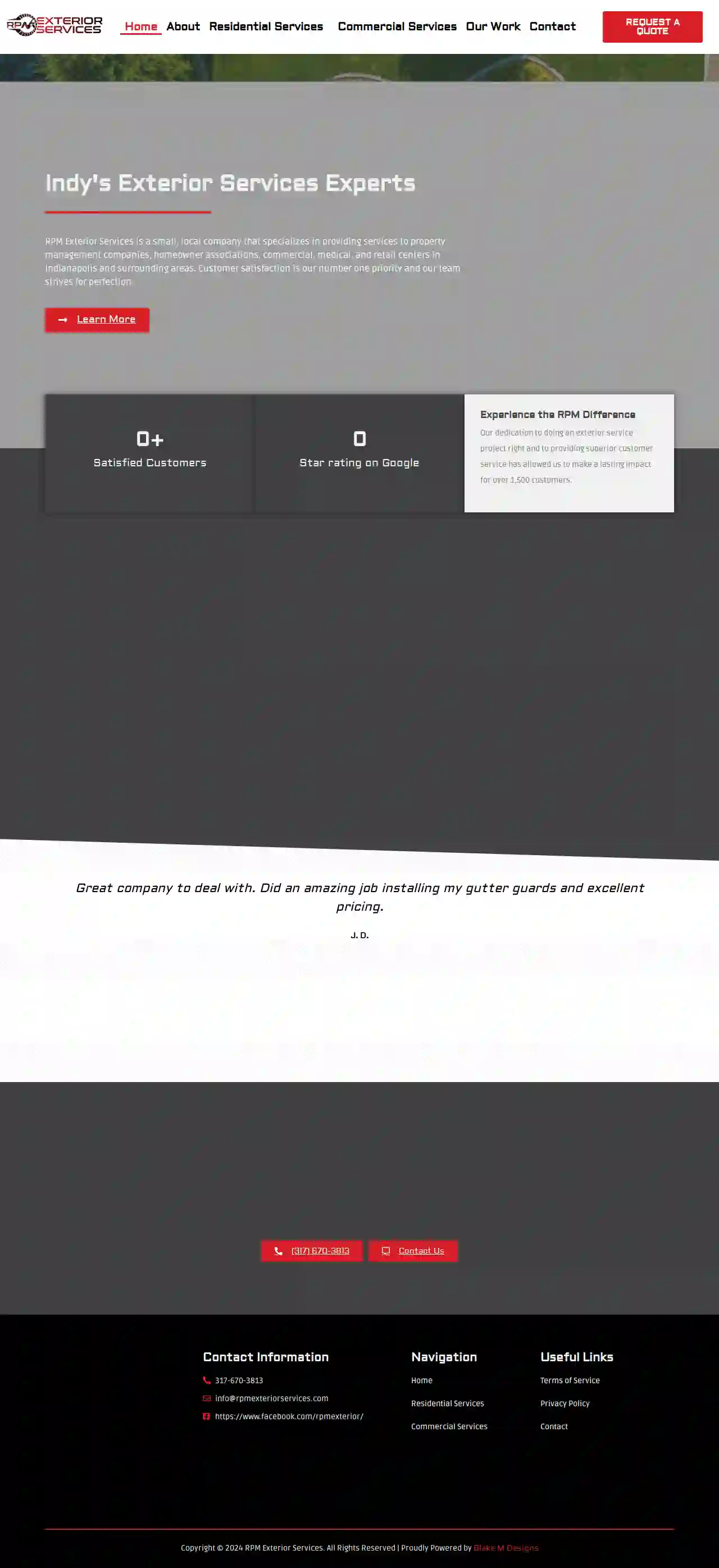
RPM Exterior Services
516 reviews1111 N. Delaware St., Indianapolis, IN, 46208, USRPM Exterior Services is a small, local company that specializes in providing services to property management companies, homeowner associations, commercial, medical, and retail centers in Indianapolis and surrounding areas. Customer satisfaction is our number one priority and our team strives for perfection. Our dedication to doing an exterior service project right and to providing superior customer service has allowed us to make a lasting impact for over 1,500 customers. The exterior of your business is very important. It often times is the first impression a potential customer receives. We help you make sure that it’s a good one! We are a full-service, exterior maintenance company located right here in central Indiana. We offer anything from full grounds maintenance to snow & ice management. We also specialize in gutter cleaning and gutter guard installation. We work with many property management companies, banks, residential homes, and businesses all over the area.We work in Indianapolis, Greenwood, Whiteland, Franklin, New Palestine, and surrounding areas.
- Services
- Why Us?
- Our Team
- Testimonials
- Gallery
Get Quote
A Plus Home and Roof Wash
565 reviewsU.S.A., Gas City, IN, 46933, US- Services
- Why Us?
- Accreditations
- Our Team
- Testimonials
- Gallery
Get Quote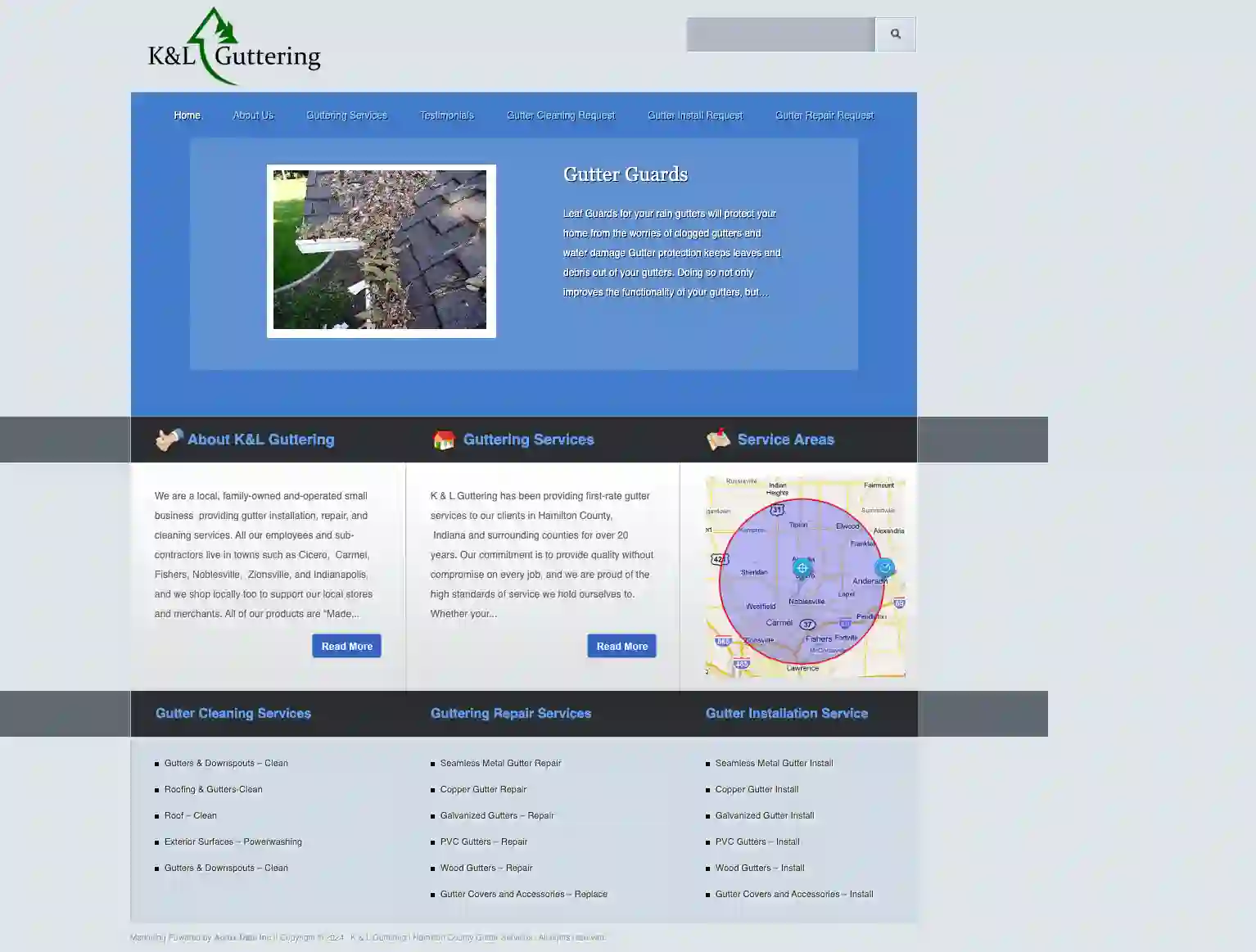
K&L Guttering
3.84 reviews1749 Nantucket Drive, Cicero, 46034, USK & L Guttering is a local, family-owned and-operated small business providing gutter installation, repair, and cleaning services. We are fully insured and professional, with all our employees and sub-contractors living in towns such as Cicero, Carmel, Fishers, Noblesville, Zionsville, and Indianapolis. We shop locally too to support our local stores and merchants. All of our products are 'Made in America,' and although we are local, K&L Guttering is also an approved gutter installer for some of America's nationally known home improvement stores.
- Services
- Why Us?
- Testimonials
- Gallery
Get Quote
Johnson Seamless Gutters
54 reviews7569 Indiana 25, Tippecanoe, IN, USJohnson Seamless Gutters is a leading provider of top-tier seamless gutter installation & repair services in Tippecanoe, IN, and surrounding areas. We are dedicated to creating trustworthy solutions for your home or business, ensuring long-lasting protection from the elements. Our commitment to quality and affordability means we use durable materials, offer quick installation times, and provide year-round availability. We pride ourselves on our meticulous work ethic and attention to detail, ensuring your gutters are in excellent working order for years to come. Our team prioritizes your peace of mind with every job, delivering results that speak for themselves.
- Services
- Why Us?
- Accreditations
- Our Team
- Testimonials
- Gallery
Get Quote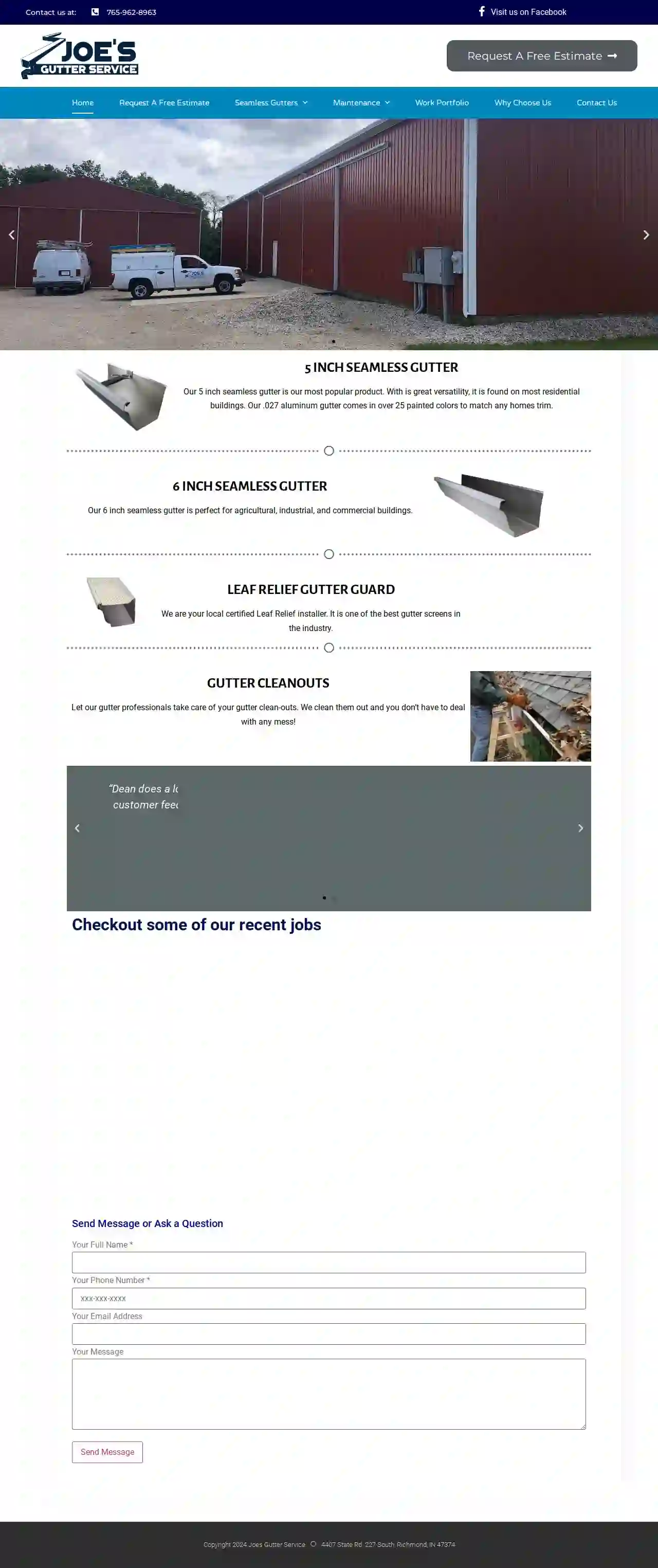
Joe's Gutter Service LLC
522 reviews4407 State Rd. 227 South, Richmond, 47374, USJoe’s Gutter was founded in 19xx by Joe.
- Services
- Why Us?
- Testimonials
- Gallery
Get Quote
Heffernan's Home Services
4.8717 reviewsIndianapolis, USHeffernan's Power Washing is a family owned business and Indianapolis' #1 rated power washing service. We provide cleaning services that can cover every aspect of your property, from your driveway to your roof, no matter how dirty it is, we can make your property look new again! When working with us you can expect a fast quote right on our website, fast scheduling, meticulous detailed work and a 100% satisfaction guarantee! Get A Fast Quote today or reach out to our fabulous customer support team for a free consultation for your power washing and other cleaning needs.
- Services
- Why Us?
- Gallery
Get Quote
SmartStyle Seamless Gutters LLC
4.962 reviewsMiddlebury, 46540, USAs your trusted partner in gutter solutions, SmartStyle Seamless Gutters, LLC delivers seamless craftsmanship for a water-resistant and aesthetically pleasing home. Discover the epitome of gutter excellence with our tailored solutions designed for lasting performance. We are proud to serve Middlebury, IN, and the surrounding areas.
- Services
- Why Us?
- Gallery
Get Quote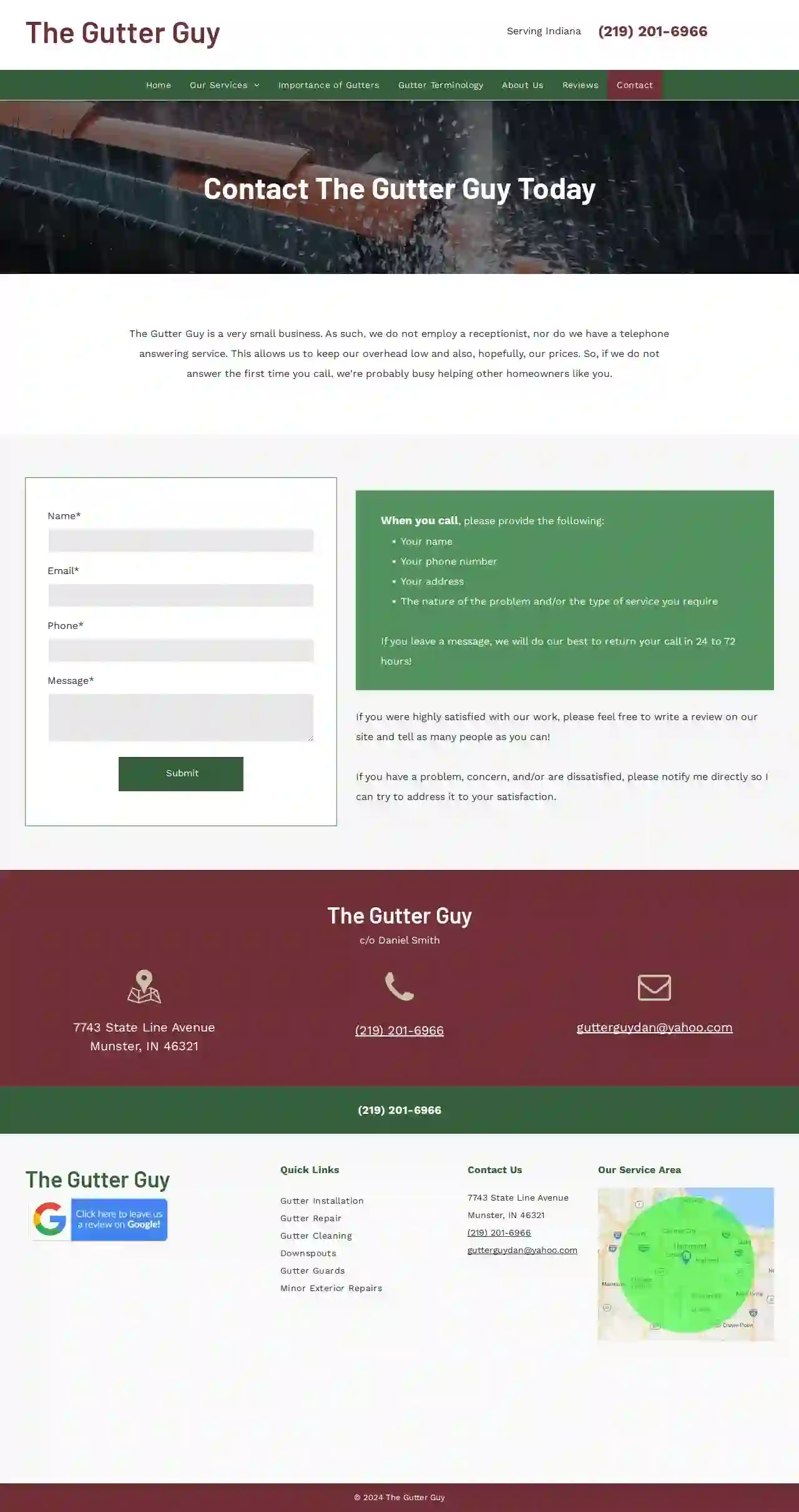
The Gutter Guy
51 reviewsMunster, IN, 7743 State Line Avenue, 46321, USThe Gutter Guy is a locally owned company serving Indiana, owned and operated by Daniel Smith of Munster, Indiana. With 40 years of experience, we provide high-quality gutter products and services that you'll value long after the initial work is complete. Our mission is to provide you with excellent craftsmanship, integrity, and reliability. We stand for providing the highest quality craftsmanship on every job we do, using only the most reliable, knowledgeable, and honest workers to assist. We guarantee nearly all the work we do, with some exceptions where we cannot guarantee the work due to the nature of the job. We are a small business, which allows us to keep our overhead low and offer competitive pricing. We are proud to serve the community and provide exceptional service to our customers.
- Services
- Why Us?
- Our Team
- Testimonials
- Gallery
Get Quote
Over 60,241+ Janitorial Businesses onboarded
Our janitorial companies operate in Noblesville & surroundings!
CleaningMatch has curated and vetted the Best Janitorial Contractors in Noblesville. Find a top & trustworthy business today.
Frequently Asked Questions About Gutter Cleaning
- Reduced Leaks: Seamless gutters have fewer seams, reducing the likelihood of leaks developing over time.
- Improved Appearance: Seamless gutters create a more aesthetically pleasing and streamlined look along your roofline.
- Less Maintenance: Fewer seams mean less opportunity for debris to accumulate, reducing the frequency of cleaning needed.
- Ladders and Safety Equipment: They use sturdy ladders and safety harnesses to access gutters safely.
- Gutter Scoops and Hand Tools: They use gutter scoops, trowels, and other hand tools to remove leaves, twigs, and debris from gutters.
- Blowers and Vacuums: They may use blowers or vacuums to remove lighter debris and leaves from gutters and downspouts.
- Pressure Washing: Some gutter cleaners use pressure washers to flush out stubborn debris and clean the gutters thoroughly.
- Debris Disposal: They bag and dispose of the collected debris properly.
- Tree Cover: If you have trees near your home, especially deciduous trees that shed leaves in the fall, you'll need to clean your gutters more frequently.
- Climate: Areas with heavy rainfall or frequent storms may require more frequent gutter cleaning.
- Gutter Guards: While gutter guards can reduce debris buildup, they don't eliminate it entirely. Even with gutter guards, it's recommended to have your gutters cleaned at least once a year.
- Safety: Installing gutter guards involves working at heights, which can be dangerous. Ensure you have a stable ladder and someone to spot you.
- Proper Fit: Gutter guards must be installed correctly to function properly. Improper installation can lead to leaks or reduced effectiveness.
- Gutter Compatibility: Not all gutter guards are compatible with all gutter types. Choose gutter guards specifically designed for your gutter system.
- Tools and Materials: You'll need tools like a ladder, measuring tape, screws or fasteners, and possibly a saw or snips to cut the gutter guards to size.
What are seamless gutters, and are they better than sectional gutters?
Advantages of Seamless Gutters:
While seamless gutters offer advantages, sectional gutters are typically more affordable and easier to repair if a section becomes damaged. The best choice for your home depends on your budget, aesthetic preferences, and the length and complexity of your roofline.
How do professional gutter cleaners clean gutters?
Professional gutter cleaners have the experience, equipment, and knowledge to ensure thorough and safe gutter cleaning.
How often should I clean my gutters?
As a general guideline, aim to clean your gutters at least twice a year, in the spring and fall. However, if you have heavy tree cover or live in an area with frequent rainfall, you may need to clean them more often.
Can I install gutter guards myself?
If you're comfortable working at heights, have the necessary tools and experience, and are confident in your ability to install gutter guards correctly, DIY installation is an option. However, for professional results and a safer approach, hiring a professional gutter guard installer is recommended.
What are seamless gutters, and are they better than sectional gutters?
Advantages of Seamless Gutters:
- Reduced Leaks: Seamless gutters have fewer seams, reducing the likelihood of leaks developing over time.
- Improved Appearance: Seamless gutters create a more aesthetically pleasing and streamlined look along your roofline.
- Less Maintenance: Fewer seams mean less opportunity for debris to accumulate, reducing the frequency of cleaning needed.
While seamless gutters offer advantages, sectional gutters are typically more affordable and easier to repair if a section becomes damaged. The best choice for your home depends on your budget, aesthetic preferences, and the length and complexity of your roofline.
How do professional gutter cleaners clean gutters?
- Ladders and Safety Equipment: They use sturdy ladders and safety harnesses to access gutters safely.
- Gutter Scoops and Hand Tools: They use gutter scoops, trowels, and other hand tools to remove leaves, twigs, and debris from gutters.
- Blowers and Vacuums: They may use blowers or vacuums to remove lighter debris and leaves from gutters and downspouts.
- Pressure Washing: Some gutter cleaners use pressure washers to flush out stubborn debris and clean the gutters thoroughly.
- Debris Disposal: They bag and dispose of the collected debris properly.
Professional gutter cleaners have the experience, equipment, and knowledge to ensure thorough and safe gutter cleaning.
How often should I clean my gutters?
- Tree Cover: If you have trees near your home, especially deciduous trees that shed leaves in the fall, you'll need to clean your gutters more frequently.
- Climate: Areas with heavy rainfall or frequent storms may require more frequent gutter cleaning.
- Gutter Guards: While gutter guards can reduce debris buildup, they don't eliminate it entirely. Even with gutter guards, it's recommended to have your gutters cleaned at least once a year.
As a general guideline, aim to clean your gutters at least twice a year, in the spring and fall. However, if you have heavy tree cover or live in an area with frequent rainfall, you may need to clean them more often.
Can I install gutter guards myself?
- Safety: Installing gutter guards involves working at heights, which can be dangerous. Ensure you have a stable ladder and someone to spot you.
- Proper Fit: Gutter guards must be installed correctly to function properly. Improper installation can lead to leaks or reduced effectiveness.
- Gutter Compatibility: Not all gutter guards are compatible with all gutter types. Choose gutter guards specifically designed for your gutter system.
- Tools and Materials: You'll need tools like a ladder, measuring tape, screws or fasteners, and possibly a saw or snips to cut the gutter guards to size.
If you're comfortable working at heights, have the necessary tools and experience, and are confident in your ability to install gutter guards correctly, DIY installation is an option. However, for professional results and a safer approach, hiring a professional gutter guard installer is recommended.